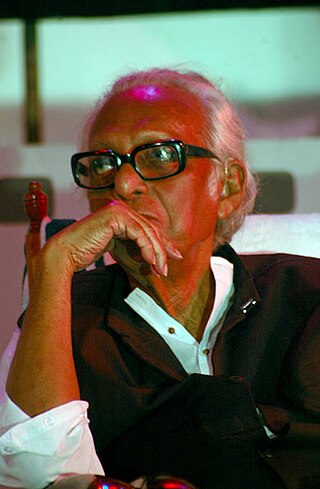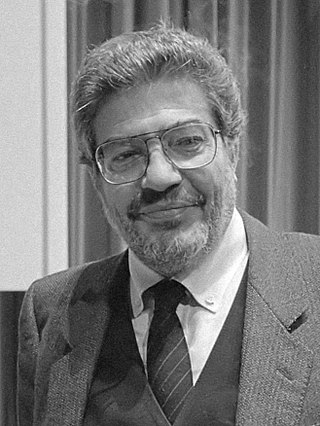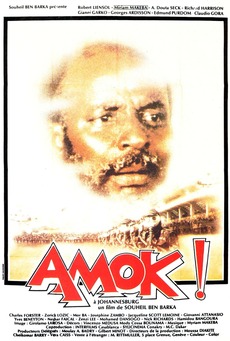Related Research Articles

Mrinal Sen was an Indian film director and screenwriter known for his work primarily in Bengali, and a few Hindi and Telugu language films. Regarded as one of the finest Indian filmmakers, along with his contemporaries Satyajit Ray, Ritwik Ghatak, and Tapan Sinha, Sen played major role in the New Wave cinema of eastern India.

The Moscow International Film Festival is a film festival first held in Moscow in 1935 and became regular since 1959. From its inception to 1959, it was held every second year in July, alternating with the Karlovy Vary festival. The festival has been held annually since 1999. In reaction to the 2022 Russian invasion of Ukraine, the FIAPF paused the accreditation of the festival until further notice.

Giuseppe De Santis was an Italian film director. One of the most idealistic neorealist filmmakers of the 1940s and 1950s, he wrote and directed films punctuated by ardent cries for social reform.

Ettore Scola was an Italian screenwriter and film director. He received a Golden Globe for Best Foreign Film in 1978 for his film A Special Day and over the course of his film career was nominated for five Academy Awards for Best Foreign Language Film.

Miguel Ernesto Littin Cucumides is a Chilean film director, screenwriter, film producer and novelist. He was born to a Palestinian father, Hernán Littin and a Greek mother, Cristina Cucumides.
Christian-Jaque was a French filmmaker. From 1954 to 1959, he was married to actress Martine Carol, who starred in several of his films, including Lucrèce Borgia (1953), Madame du Barry (1954), and Nana (1955).

The history of the cinema of Morocco dates back to "The Moroccan Goatherd" by Louis Lumière in 1897. During the French protectorate, films were produced and directed by French filmmakers, and in 1952, Orson Welles directed his Othello in the historic city of Essaouira. Since independence in 1956, Moroccan film directors and producers have produced a growing number of films, some of which have been met with growing international success.
Humberto Solás was a Cuban film director, credited with directing the film Lucía (1968), which explored the lives of Cuban women during different periods in Cuban history.

Stanislav Iosifovich Rostotsky was a Soviet film director and screenwriter, the recipient of the two USSR State Prizes and a Lenin Prize. He was named People's Artist of the USSR in 1974.
Paulin Soumanou Vieyra was a Dahomeyan/Senegalese film director and historian. As he lived in Senegal after the age of 10, he is more associated with that nation.
Mohamed Hamed Hassan Khan was an Egyptian film director, screenwriter, and actor. He was a pivotal member of the "1980s generation" in Egyptian cinema, along with directors such as Khairy Beshara, Daoud Abd El-Sayed, Atef El-Tayeb, and Yousry Nasrallah. His main aesthetic credo, in line with directors from his generation, was a reinvigorated realism seeking direct documentation of everyday life in Cairo, beyond the walls of the studio. Khan has 4 films in the Top 100 Egyptian films list.

Mehdi Ben Barka was a Moroccan nationalist, Arab socialist, politician, revolutionary, anti-imperialist, head of the left-wing National Union of Popular Forces (UNFP) and secretary of the Tricontinental Conference. An opponent of French Imperialism and King Hassan II, he was "disappeared" in Paris in 1965.
Daniel Duval was a French film actor, director and writer.

The Assassination is a 1972 French-Italian political thriller film directed by Yves Boisset. Starring Jean-Louis Trintignant, Gian Maria Volonté, and Roy Scheider, it was released in the U.S. as The French Conspiracy.

La guerre du pétrole n'aura pas lieu is a 1975 Moroccan drama film directed by Souheil Ben-Barka. It was entered into the 9th Moscow International Film Festival.
The 13th Moscow International Film Festival was held from 7 to 21 July 1983. The Golden Prizes were awarded to the Moroccan-Guinea-Senegalese film Amok directed by Souheil Ben-Barka, the Nicaraguan-Cuban-Mexican-Costa Rican film Alsino and the Condor directed by Miguel Littín and the Soviet film Vassa directed by Gleb Panfilov.

Amok is a 1983 Moroccan drama film directed by Souheil Ben-Barka. It won the Golden Prize at the 13th Moscow International Film Festival. Borrowing heavily of Alan Paton's Cry, the beloved country but putting the action in the context of the Soweto uprising, it tells the initiating journey of an old teacher from a backward Natal village to the conflict-ridden modern Johannesburg.
The 15th Moscow International Film Festival was held from 6 to 17 July 1987. The Golden Prize was awarded to the Italian film Intervista directed by Federico Fellini.

Aziz Tazi is a Moroccan film writer, director and producer featured in Forbes Africa's 30 Under 30. Tazi made his directorial debut with the feature film Night Walk. The crime drama was acquired by Lionsgate and is the first Moroccan film in history to get Hollywood distribution.
A Thousand and One Hands is a 1973 Moroccan film directed by Souheil Ben-Barka. It was screened abroad and received critical acclaim despite being censored in Morocco.
References
- ↑ "Souheil Ben-Barka". mubi. Retrieved 6 January 2013.
- ↑ "9th Moscow International Film Festival (1975)". MIFF. Retrieved 5 January 2013.
- ↑ "13th Moscow International Film Festival (1983)". MIFF. Retrieved 30 January 2013.
- ↑ "15th Moscow International Film Festival (1987)". MIFF. Retrieved 18 February 2013.
- ↑ Oudrhiri, Kaouthar (11 October 2019). "Souheil Ben Barka "Je dirigeais le CCM comme je l'entendais, aujourd'hui les choses ont changé"". Telquel . Retrieved 17 December 2019.
- ↑ Barlet, Olivier (17 September 2019). "De sable et de feu (le rêve impossible !), de Souheil Ben Barka". Africultures . Retrieved 17 December 2019.
- ↑ de Rochebrune, Renaud (26 September 2019). "Cinéma : Souheil Ben Barka en son royaume". Jeune Afrique . Retrieved 17 December 2019.
- ↑ Armes, Roy (2008). Dictionary of African Filmmakers. Indiana University Press. p. 44. ISBN 978-0-253-35116-6.
- ↑ Brière, Jean-François (2008). Dictionnaire des cinéastes africains de long métrage (in French). KARTHALA Editions. p. 55. ISBN 978-2-8111-4250-6.